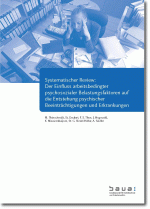Surveying occupational medicine and epidemiology
Systematic reviews provide clear summaries of what is currently known about topics of all kinds, such as therapy and prevention. This significantly simplifies physicians and scientists’ day-to-day work.
The number of scientific publications available increases massively every year, making it a growing challenge for clinicians, scientists, and political decision-makers to keep abreast of the full range of developments in (occupational) medicine. It is therefore necessary to systematically summarise and critically evaluate the individual studies produced on these topics.
Systematic reviews simplify practitioners’ work
Systematic reviews consequently facilitate the work of evidence-based medicine. A systematic review is frequently the sole means of finding adequate answers to questions about everyday practice.
Systematic reviews can address topics of all kinds. In medicine, they have an established place above all in the fields of therapy and prevention. When it comes to occupational medicine and occupational epidemiology, systematic reviews offer a well-founded basis for the best-possible organisation and regulation of occupational safety and health activities, the evidence-based implementation of health promotion schemes, and primary, secondary, and tertiary preventive interventions in the world of work. Furthermore, many of the recommendations given in (occupational) medical guidelines, for example, are based on systematically summarised evidence. This may be presented in the form of a systematic review, overview of systematic reviews, or scoping review.
Systematic review
In a systematic review, all the primary studies on a clearly formulated question are searched systematically and selected in accordance with particular inclusion and exclusion criteria. The studies included are evaluated critically, then the research findings extracted and summarised descriptively or quantitatively using statistical methods (meta-analysis). Not every systematic review includes a meta-analysis.
Overview of systematic reviews
Given the publication of countless systematic reviews, a new way of synthesising evidence has been developed that summarises what is known on the basis of previously published reviews. These overviews (also referred to as “reviews of reviews” or “umbrella reviews”) are basically drawn up in accordance with the same methodological standards as apply for the conduct of systematic reviews. However, different quality assessment instruments from those for primary studies are needed to judge the quality of the reviews that are covered.
Scoping review
A scoping review is well-suited in particular for the broad, exhaustive collation of the current evidence base about a subject. Starting from a question that is formulated as generally as possible, all the evidence is systematically collected, structured, and analysed qualitatively. Gaps in the research can be identified on the basis of a comprehensive survey of the scientific facts. Further stages are possible, with systematic reviews being prepared on specific questions in the subject area under examination, with or without meta-analyses or overviews.
Where can I find systematic reviews?
Cochrane Collaboration
The Cochrane Collaboration is regarded as a trustworthy, high-quality source for systematic reviews. Cochrane reviews systematically summarise the research findings on questions of healthcare provision and are recognised internationally as setting quality standards for evidence-based medicine.
In the field of work and health, for example, the Cochrane Work editorial review group has published systematic reviews of exposures and risks at work, the prevention of occupational diseases and job-related conditions, and health promotion in the workplace.
Each systematic review deals with a clearly formulated question, for example: Can person and work-directed interventions enhance return to work for patients with coronary heart disease compared to no intervention?
To answer this question, all the primary research studies that satisfy certain criteria are collated. They are then evaluated following stringent guidelines in order to establish whether there is convincing evidence for a given intervention.
Databases
An extensive collection of systematic reviews is offered by the Epistemonikus bibliographical database. Other databases such as Medline (accessible via search platforms like PubMed or Ovid) include systematic reviews as well.
Systematic overviews on topical subjects and questions are also drawn up within the Federal Institute for Occupational Safety and Health (Bundesanstalt für Arbeitsschutz und Arbeitsmedizin, BAuA) and made publicly accessible. For example, the Medical Expert Advisory Committee on Occupational Diseases (Ärztlicher Sachverständigenbeirat “Berufskrankheiten”, ÄSVB) and its Scientific Office, which is based at BAuA, conduct systematic reviews of selected topics on which they provide advice. The ÄSVB is tasked with advising the German Federal Government about the recognition of new occupational diseases and updates to the definitions of established occupational diseases. The Scientific Office supports the Medical Expert Advisory Committee organisationally and scientifically in the performance of its work.

